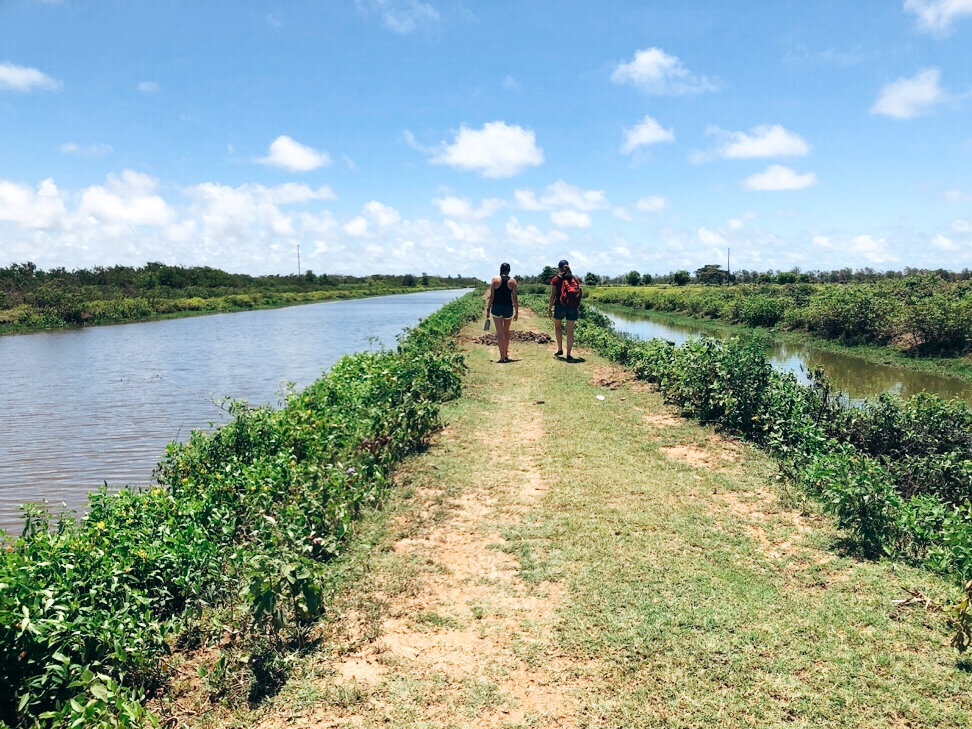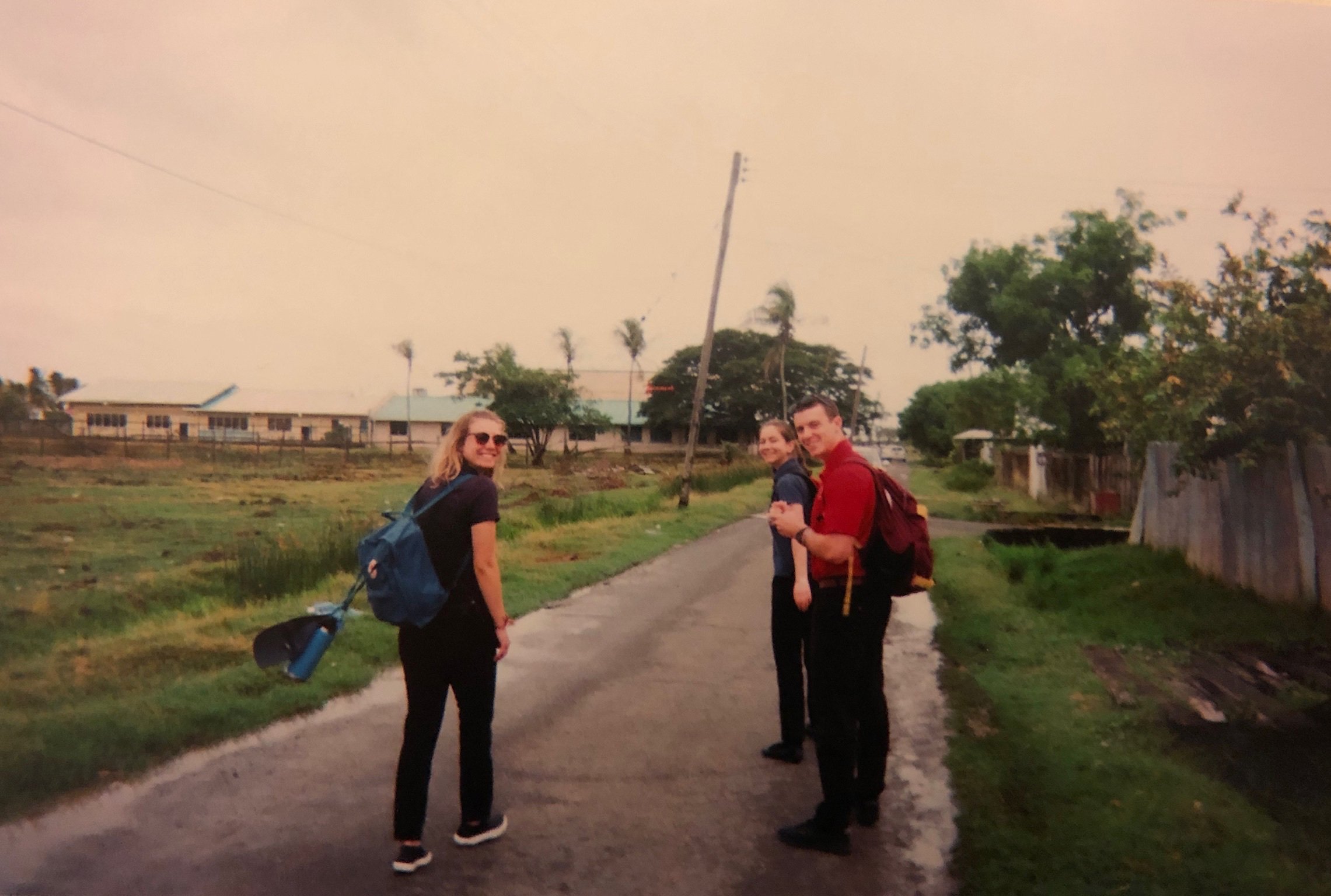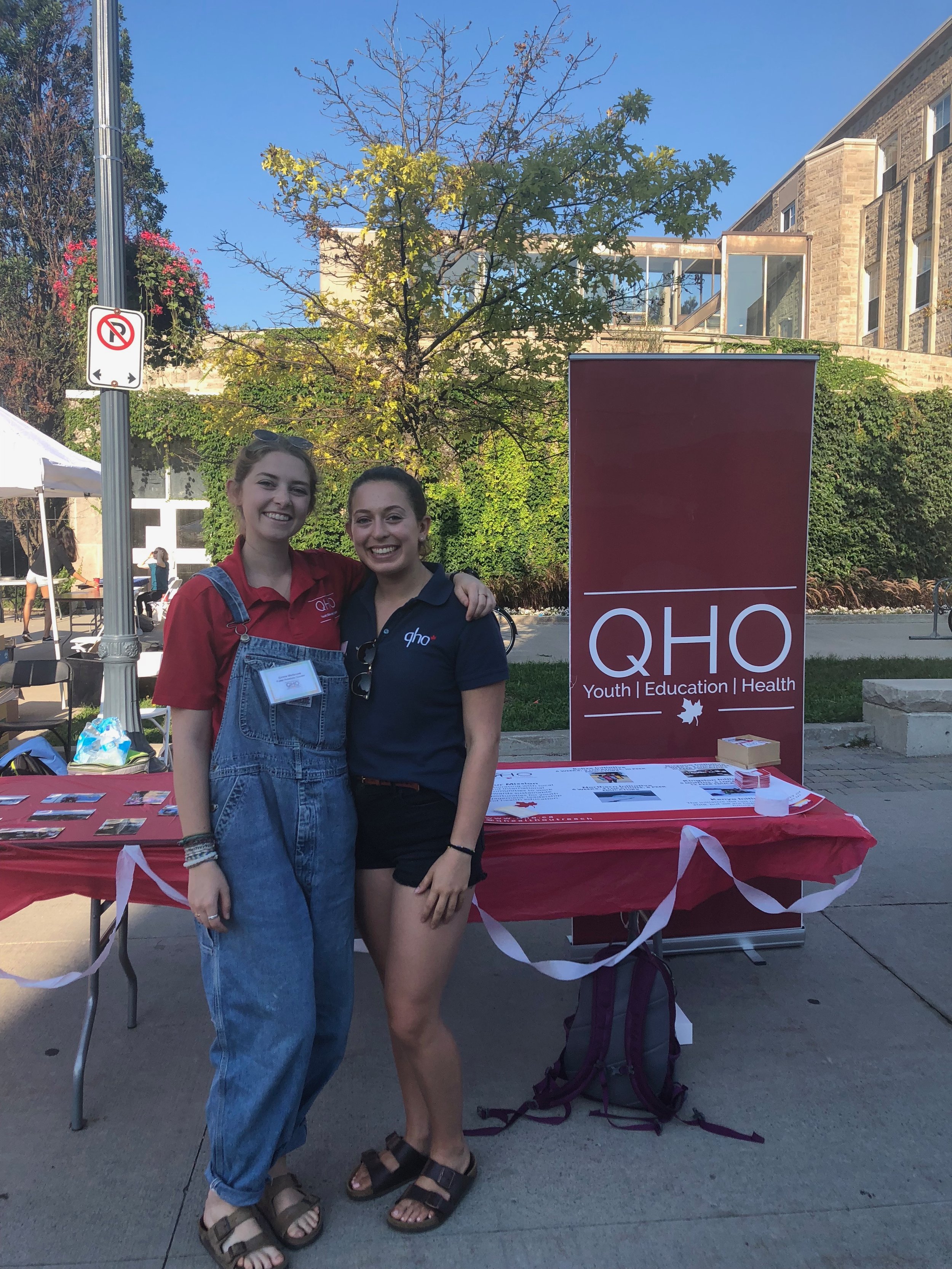












Engaging youth through health & education.
Our Vision:
Healthy and resilient communities built by youth driven to lead conversations about health and well-being.

Our Guiding Principles
Needs-Based
Peer-to-Peer
Sustainability
Transparency
Mutual Learning
Cultural Sensitivity
Community Engagement
Student Run
Learn more about our diverse initiatives.
Listen up!
Check out the latest episode of our podcast, QHOnAir.
FAQs
+ What is a Peer Educator (PE)?
QHO Peer Educators (PEs) are Queen’s University students that are selected to volunteer in one of QHO’s host communities locally, nationally, and internationally. Currently, QHO is divided into three initiatives in communities in Guyana, Kingston, and Northern Canada. PEs volunteer in schools and within the broader community alongside local partners to facilitate health-based discussions for youth, covering physical, mental, sexual and social health topics. In the case of QHO’s Guyana and Northern Canada initiatives, PEs used to spend the school year leading up to initiative training for their volunteer placement in the summer. However initiative activities have shifted during the COVID-19 pandemic, leading to the implementation of virtual work by PEs during the winter term now as well. Kingston PEs go through an intensive “crash course” training process in the early Fall and continue to grow throughout the year while they facilitate health discussions with youth in the Kingston community each week.
+ What’s the difference between an Intern and a PE?
Interns and PEs are both hired in the Fall of each year. Interns are chosen to assist a specific position or POD on QHO’s Executive Team throughout the school year, and will gain a comprehensive understanding of how a registered charitable organization works. PEs are QHO volunteers hired to facilitate health discussions in various locations in Canada and abroad. We welcome those of all years and faculties to apply for QHO, whether it be an Intern or PE role. Some students choose to begin their time with QHO as an Intern to discover more about the organization before becoming a PE, but many volunteers enter QHO as PEs. No experience is required for either role.
+ What’s the difference between the Kingston Initiative and the Summer Initiatives?
The Kingston Initiative runs throughout the school year, with PEs generally being tasked with facilitating discussions in 1-2 classrooms or youth spaces per week from October to April. These PEs go through training before entering their role in the early fall, and continue their training periodically during regular meetings throughout the year. The Summer Initiatives (Guyana, and Northern Canada) also hire PEs in the Fall, but then follow a different timeline. Summer PEs are trained throughout the year to run initiative activities. Initiative activities are currently running virtually in the winter term. When there is opportunity for in-person work, PEs go on initiative in May to June, in which they live in their host communities full-time and facilitate needs-based health discussions for 6-8 weeks.
+ How long is a QHO Initiative?
Length varies by location and Initiative. The Kingston Initiative normally runs from October (once PEs are hired) to April and the Summer Initiatives normally run for 6-8 weeks from May to June. However, given ongoing changes to initiative structure due to the incorporation of virtual work, initiative activities have run throughout the winter term as well (January to April).
+ How much does it cost to go on a QHO Initiative?
QHO depends in large part on financial support from individuals and organizations (both public and private sector). Although QHO hosts a variety of fundraising events throughout the school year, charitable donations are critical to the viability of our organization. As such, we welcome and greatly appreciate financial contributions of all kinds. While QHO depends in large part on financial support from individuals and organizations (both public and private sector), PEs themselves are normally responsible for an additional individual fundraising goal which can vary from year to year, but is never higher than $1000 per PE. Initiative Directors support PEs throughout the school year to help them reach their personal fundraising goal for the year.
+ How is the money that is donated and fundraised for QHO used?
As students, we work very hard throughout the year to fully fundraise our initiatives each year. We are always grateful for each and every donation that we receive. 96.4% of money goes directly towards the costs of running our initiatives. Being as cost-effective as possible, each initiative uses their budget to finance the cost of flights, housing, food, water, and internet for Peer Educators. The budget is also used specifically for teaching supplies and costs associated with running outreach activities and other programming within the community. The budget does not finance the purchase of transportation to and from Toronto Pearson Airport, any immunizations needed to go on Initiative, clothing, personal souvenirs, excess food, or personal travel costs.
+ Do I need any shots or immunizations to go on Initiative?
QHO advises that PEs on Summer Initiatives consult a travel clinic or doctor who can advise them on whether any immunizations are needed for their specific location. QHO cannot give out medical advice, although once PEs are hired to a specific initiative location, their Initiative Directors can speak to the immunizations they received in previous years, giving PEs an idea of what is advised. Some immunizations may be required to travel from the initiative location back to Canada. PEs must provide proof of immunizations to QHO before departing on initiative. AMS Health Insurance or personal insurance should cover a part of immunizations. QHO will not cover the cost of these. The KFL&A Public Health Immunization and Travel Clinic is a good resource for PEs.
+ What is the time commitment of a PE during the school year?
Summer Initiative PEs: ~4-8 hours/week
PEs are expected to attend weekly Initiative-Specific Meetings which range from 1-2 hours, and mandatory weekly Education Sessions which are 2 hours on Sunday nights. These weekly sessions are devoted to training PEs in preparation for Initiative by focusing on topics such as cultural sensitivity, ethical considerations, skills to effectively facilitate health discussions, safety, logistics, and more. PEs will also plan initiative-specific fundraising events and will be required to execute them, which can add on to the weekly time commitment. Additionally, PEs are required to attend all QHO-related events, including QHO-wide fundraisers.
Kingston Initiative PEs: ~4-8 hours/week
Kingston PEs are on initiative during the school year. This means once they are hired in October, they will go through a training process, then start volunteering in schools and with community organizations immediately for the remainder of the school year. Generally, Kingston PEs can expect to have 1-2 classes or sessions they are responsible for facilitating each week, which are normally ~1 hour long (note, this excludes travel time). It is important to note that time commitment for Kingston PEs is higher when they are first hired to allow for training. PEs can expect to allocate ~2-4 additional hours per week immediately following the hiring period. Kingston Initiative PEs are required to attend weekly initiative-specific meetings for 1-2 hours per week. These meetings will be used to complete ongoing training with the PEs and give logistical updates. PEs will also plan initiative-specific fundraising events and will be required to execute them, which can add on to the weekly time commitment. Additionally, PEs are required to attend all QHO-related events, including QHO-wide fundraisers.
+ What is the application process?
In the Fall, QHO hosts three application processes: Kingston PE, Summer PE, and Intern hiring. A separate application is required for each of these hiring processes. For Kingston PE hiring, which happens approximately 1-2 weeks before Summer PE hiring, candidates who are successful will receive an individual interview in the first round of our hiring process. If they are successful in the individual interview portion, candidates will move onto the second round of hiring, a group interview. Kingston PE applicants can choose to also be considered for a Summer PE position if unsuccessful. Additionally, if a successful Kingston PE applicant decides they would also like to be considered for a Summer PE position, they can re-enter the Summer PE hiring process. The Summer PE application process is the same as the Kingston PE hiring process: it consists of an application, individual interview, and then a group interview. Specific initiative groups are selected by the Initiative Directors and General Co-Directors based on a variety of factors, including team dynamics. Each Summer PE applicant is considered for each summer initiative location. The Intern application process involves a written application and then an individual interview.
+ What makes QHO useful, effective, and sustainable in the organization’s partner communities?
Firstly, QHO believes that creating learning opportunities and continuing positive conversations surrounding health related topics, in any capacity, is beneficial. QHO is made up of like-minded individuals who are ultimately passionate about health and believe in the positive benefits that knowledge surrounding health topics can provide for both immediate and future generations. As young people ourselves, the peer-to-peer teaching and learning relationship that QHO PEs bring to our programming allows us to relate to students on a level that vastly increases the effectiveness in which many of these topics can be taught. When teaching about topics such as puberty, peer pressure, and self-esteem, we are able to share our own stories and experiences in a relatable manner, as it wasn’t that long ago which we were learning about these things for the first time! When talking about more “awkward” topics, often in the area of sexual health, we are able to make things less uncomfortable by relating to students and teaching in a more casual and personable way. Peer Educators are trained thoroughly before carrying out QHO’s initiatives, ensuring that they understand the importance of focusing on health topics that are culturally and socially relevant to the individual community they will work with. QHO provides Peer Educators with the tools they need to be able to work effectively with community members, school staff, partner organizations, and students while on initiative. Furthermore, members of the Executive Time work tirelessly throughout the school year to facilitate these partnerships and relationships, setting the stage for effective, relevant, needs-based initiatives. Many of our community partners ask that QHO work within the school(s), so that as many youth as possible can be reached, and schools can prioritize health education during the time that Peer Educators are there. QHO as an organization is committed to placing a larger emphasis on after school programming and workshop-style lessons to maximize our organization’s impact and reach. QHO feels that a focus on workshop-style outreach programming outside a classroom setting can also serve to strengthen the peer-to-peer aspect of QHO’s initiatives.
+ What do Peer Educators do while on initiative?
During the academic year, Peer Educators within the Kingston Initiative work within nine different schools, teaching our health-based curriculum and running activity days. In the spring, Peer Educators from the Guyana, Belize, and Northern Canada Initiatives run their initiatives within our partner communities for approximately 6 to 8 weeks. On initiative, PEs work with school staff, community members, and local health workers to utilize their training. They ensure that the health-related discussions, workshops, and afterschool activities they facilitate are effective, relevant, and tailored to the needs, wants, and local culture of the community. While working with the students, PEs focus their teaching style, lessons, and time to establish a peer-to-peer relationship with the youth they interact with. QHO believes that this peer-to-peer relationship allows for a more dynamic and relatable learning experience for our students and is a large contributor to QHO’s effectiveness within the classrooms. Peer Educators focus much of their time within classrooms, but are also active in the community, where they run additional extracurricular activities and workshops for students and community members. These activities are conducted with the goal of increasing opportunities for health-centered learning and youth empowerment.
+ How do we monitor the progress and effectiveness of our Initiatives?
QHO-wide
QHO has approximately 30 hard-working and talented Executive Team members who work throughout the year to evaluate and improve our training, policies, and effectiveness within our initiatives in reference to our progression throughout our Evaluation Framework and feedback from our partner communities and Peer Educators. Our Executive Team emphasizes evaluating collaboration and feedback methods that we use in regards to our partners to ensure that our organization maintains the principles set out by our mission statement.
Initiative-specific:
While on initiative, Peer Educators are responsible for completing daily teaching logs, an evaluation package, weekly reports, needs assessments throughout their initiative, and policy reflections. Peer Educators ensure that their programming is based on feedback given by stakeholders within our partner communities over the course of the initiative - including throughout the year leading up to initiative and upon its start.
Post Initiative:
Peer Educators are required to fill out a program report which extensively outlines their experience in addition to completing a debrief call with the Monitoring and Evaluations Coordinator, in which they discuss and look critically at their experience. Successes, ideas, and any concerns are presented to the incoming Executive Team who can incorporate feedback into future initiatives. QHO consults experts and professionals in the fields of healthcare, global development, global health, and education with regards to our training and our policies through the use of our Advisory Committee, which meets periodically throughout the year. QHO works with the Queen’s University International Centre (QUIC) to conduct activities with past Peer Educators surrounding their experiences on initiative.










